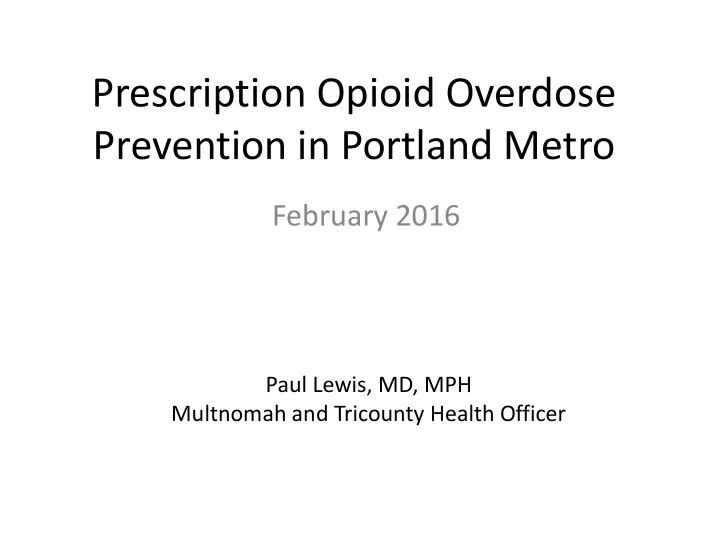

Prescription Opioid Overdose Prevention in Portland Metro February 2016 Paul Lewis, MD, MPH Multnomah and Tricounty Health Officer
Social Environment Healthcare Environment Prescriber Factors Patient Factors leading to Rx Dependence Addiction Overdose Hospitalization Death Appropriate Rx Diversion Transition to heroin
Social Environment Healthcare Environment Expectation about effectiveness and safety of opioids No insurance coverage for alternative treatments Family and peer experiences Few providers for alternative treatments Social and financial stress Limits on Medically Assisted Treatment Lack of social services and support Shortage of addiction providers Inadequate or ineffective guidelines Prescriber Factors Increased Pain Awareness Short appointments Concern re: Pt Perceived lack of options satisfaction/liability Lack of pain specialists Pharma promotion of opioids Knowledge, Skills, Abilities re: chronic pain Professional norms Inadequate mentoring, monitoring of practice Deception by patients Patient Factors leading to Rx Adv Childhood Events, Pain, Stress, Anxiety, Depression Dependence Expectations, Lack of Trust Addiction Overdose Hospitalization Death Appropriate Rx Diversion Transition to heroin
Consequences of Opioid Prescriptions Public Patients Providers Rx Recipients Heroin Users
Multi-Level Interventions To Improve Safety Public Patients Providers Rx Recipients Heroin Users
Tricounty Regional Opiate Safety 2014 2015 2016 Public Education HCWC Support WGs expand Patient/Provider Ed Half-day Summit Standard Finalized Expand MAT Workgroup(s) Appendix written Expand Addiction Rx convened Implementation Replicate successful Draft Standard Communication Chronic Pain Models Plan Multi-partner Developed Monitor Outcomes Agreement Expand Naloxone announcement Availability 2 nd Opiate Safety Drug Disposal Initiative Launched Regional Summit
Regional Guideline Development Process • Leveraged Healthy Columbia Willamette Hospital, CCO, and County partnership • Identified champion to lead workgroup • Adopted modified Delphi Process • Extensive use of pre-meeting surveys • Addition of non-HCWC stakeholders • Communication planning linked to Multnomah County Report
Guideline Components https://multco.us/file/47545/download • Scope: Chronic Non-cancer, non-terminal pain • Risk Assessment – PDMP, tools, UDS • Informed consent, treatment agreements • Dosing limit (120 MED) • Comprehensive treatment plan • Behavioral health plan • Avoid benzos and other sedatives • Refer to substance use disorder treatment • Consider naloxone co-prescribing
Healthy Columbia Willamette Opioid Prescribing Standards • Standing collaboration between 4 Portland- Vancouver county Public Health Departments, all regional hospitals (community benefit), 2 metro CCOs • Assessment completed in 2013 identified accidental death as leading cause for years of life lost – Drug overdose major contributor – Prescription drug workgroups launched • Standards, Education, Monitoring
2016 Portland Metro Prescription Safety Coalition
Recommend
More recommend